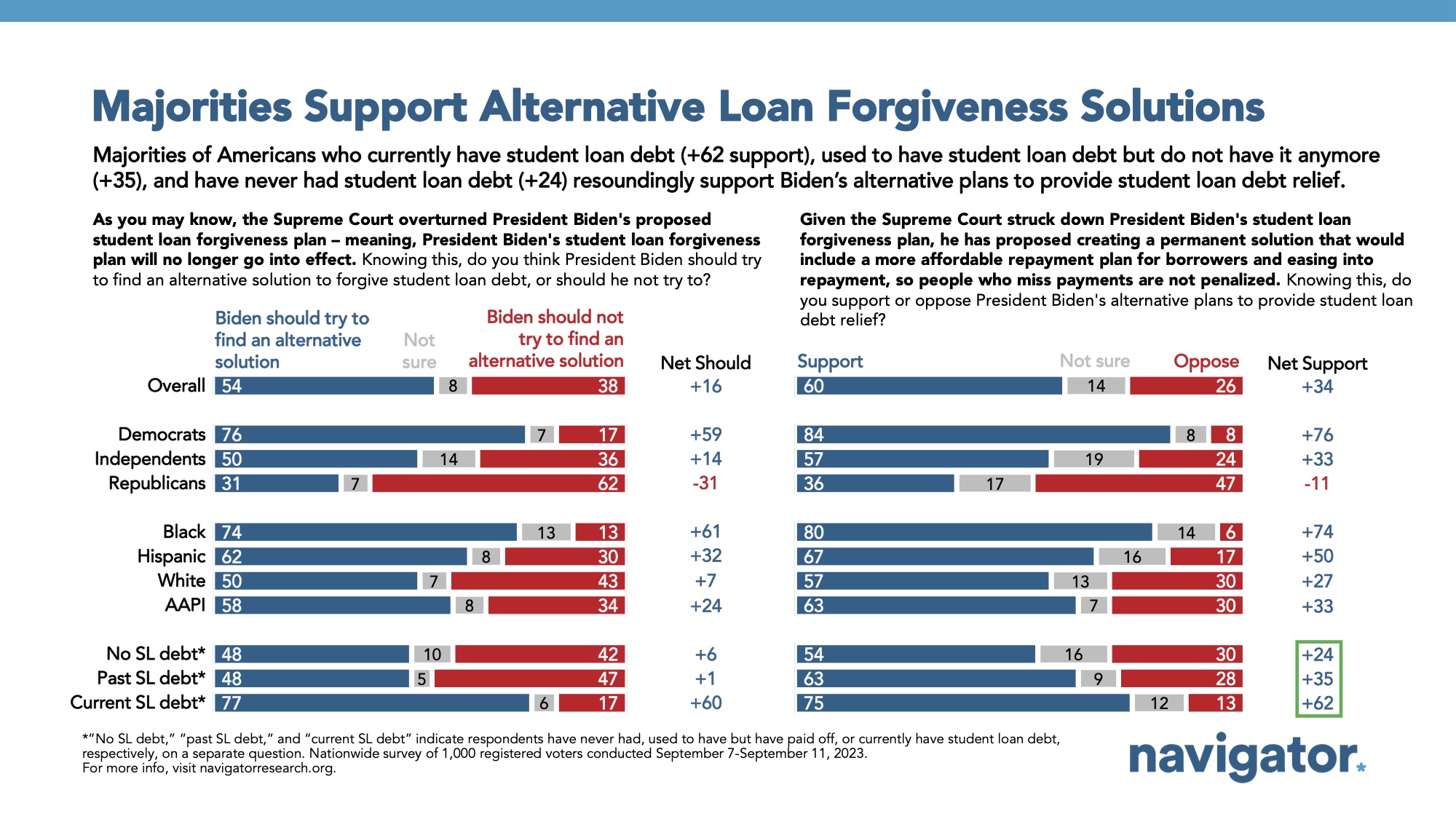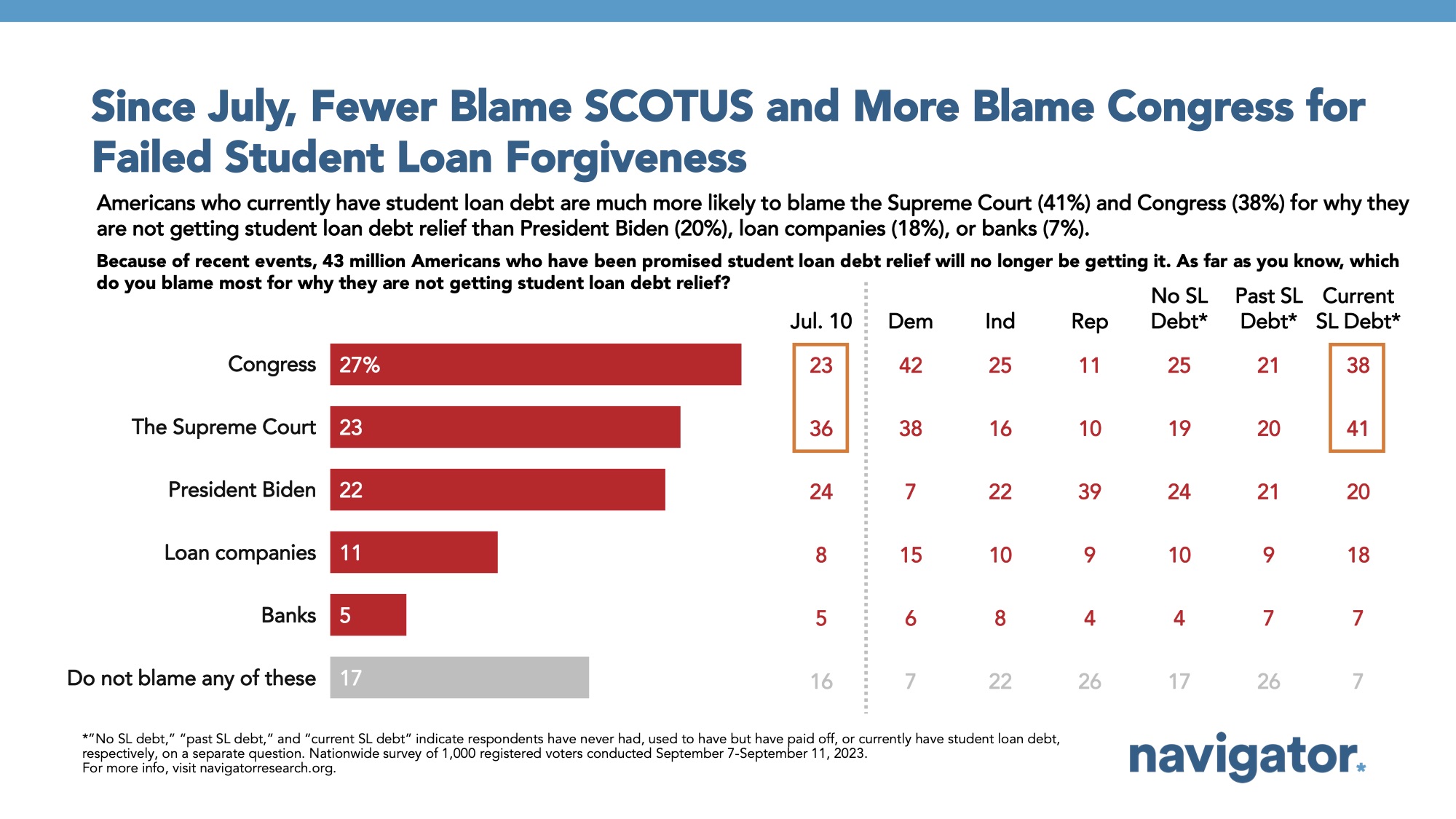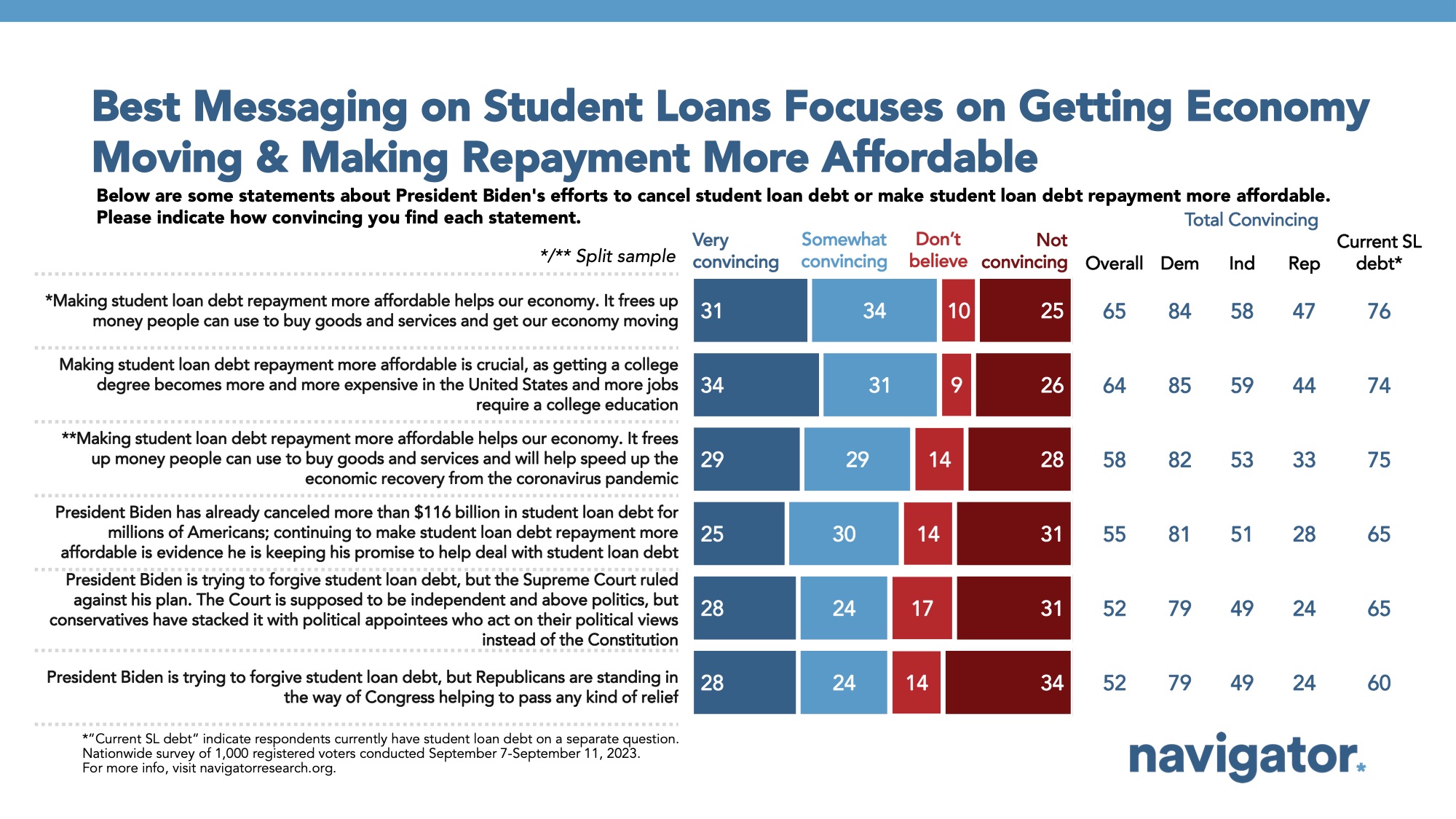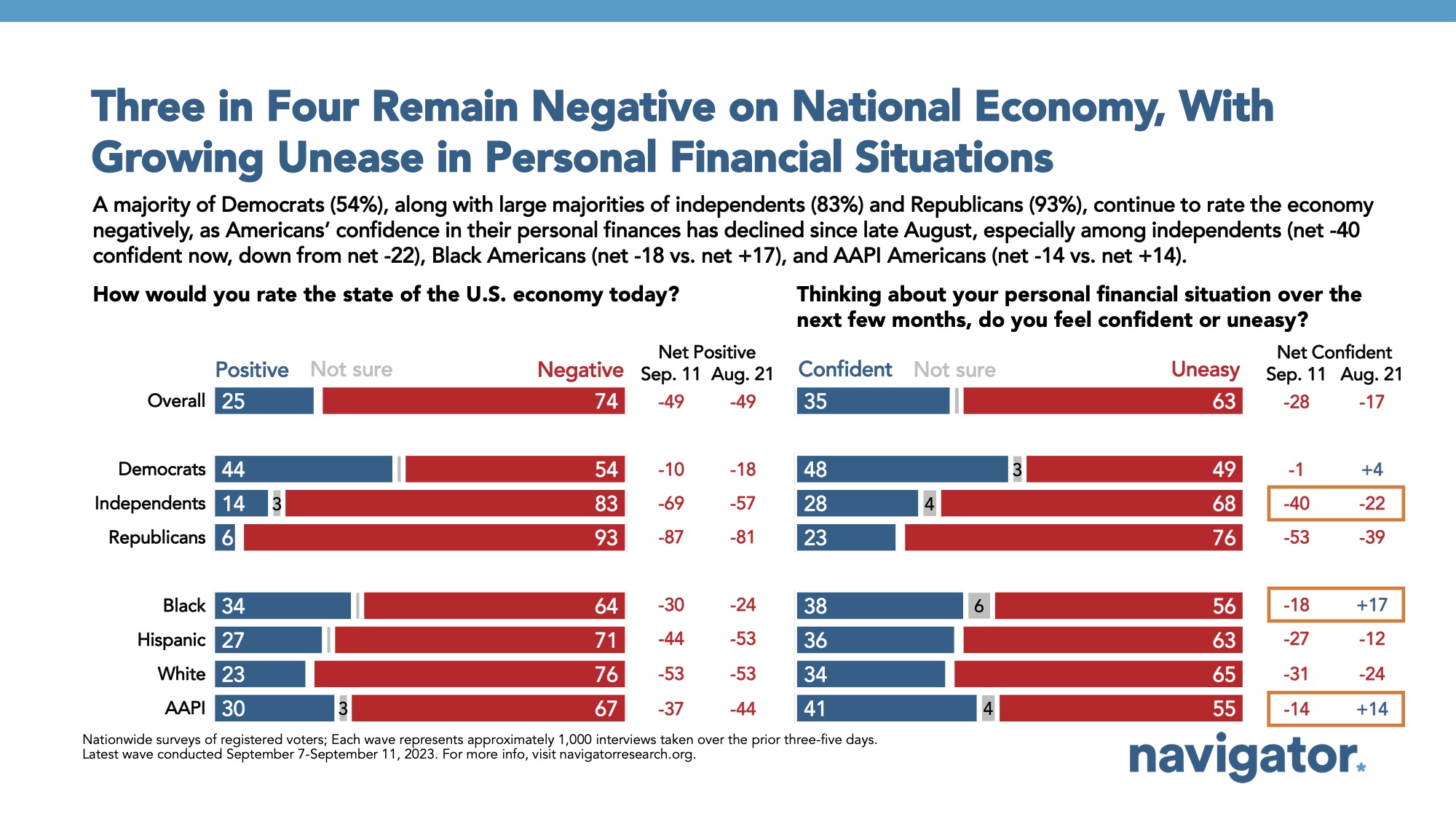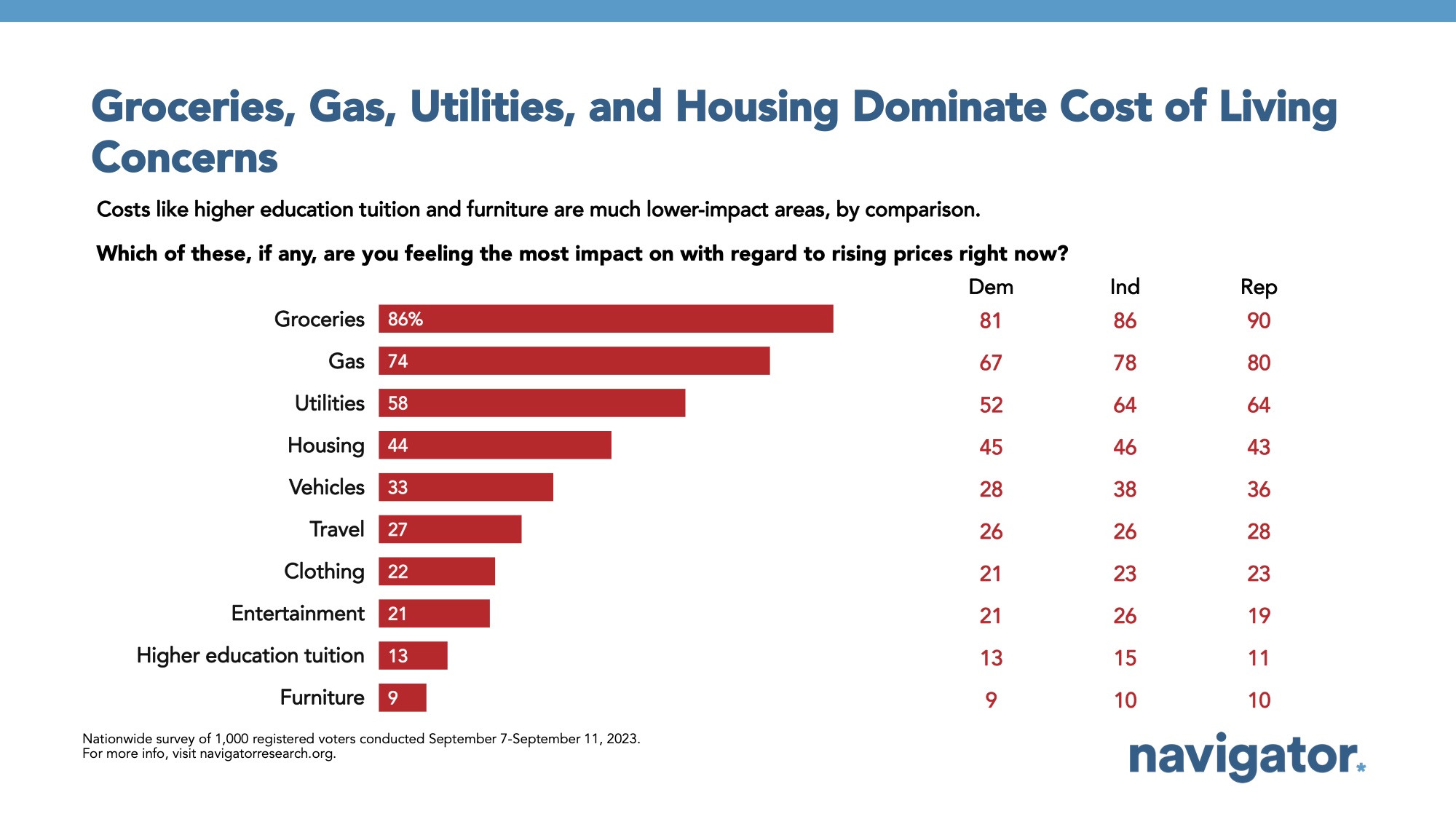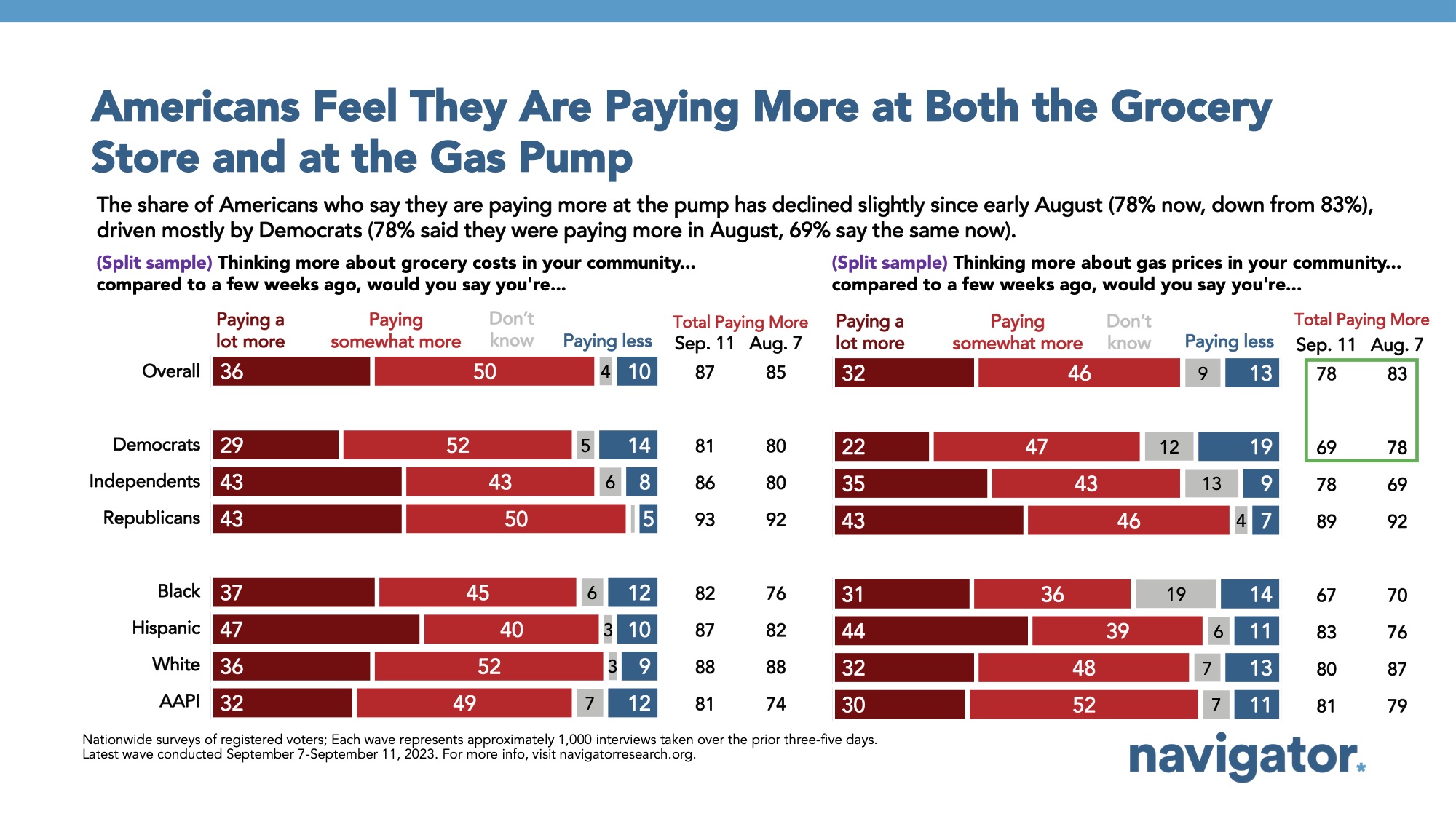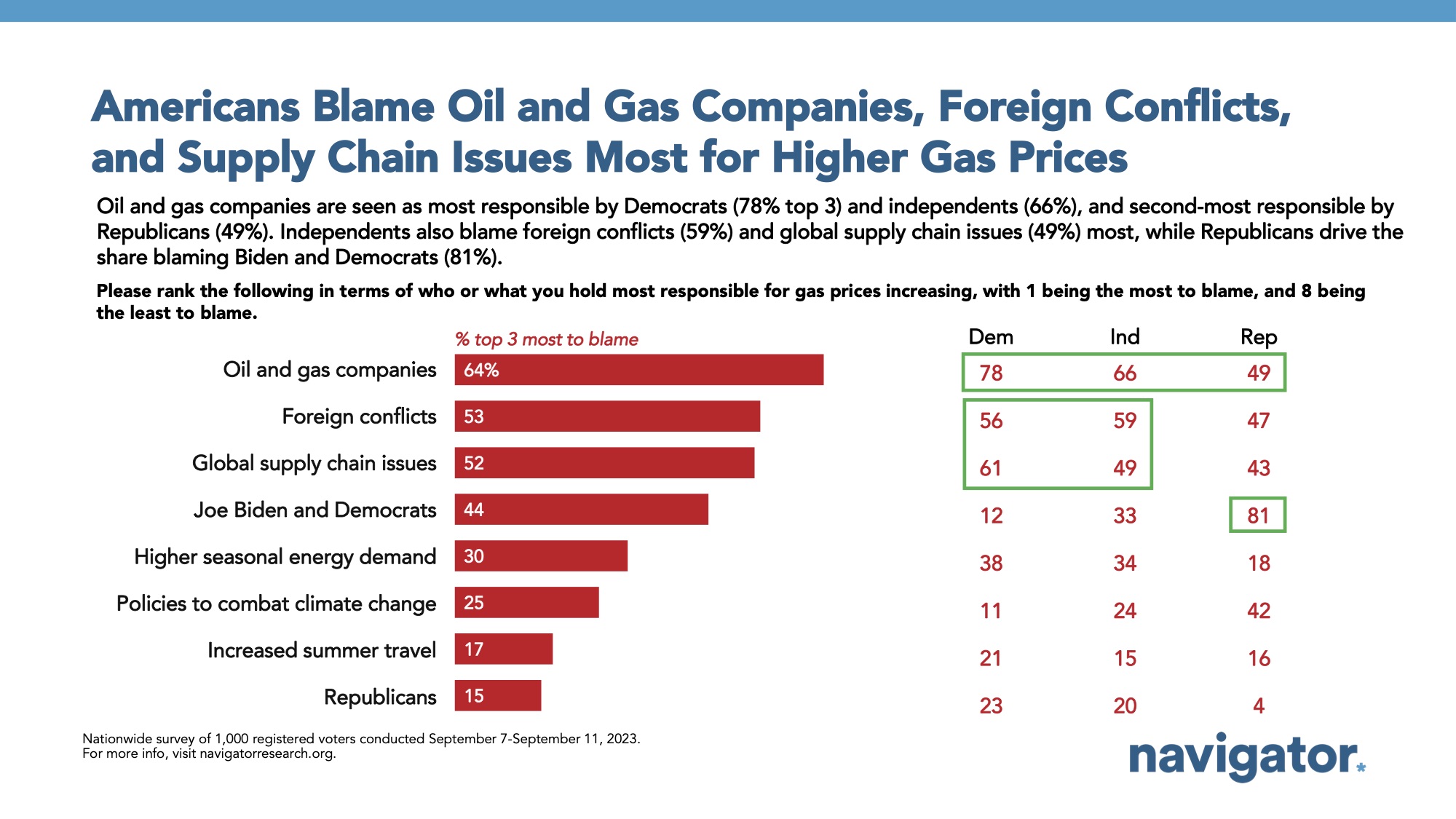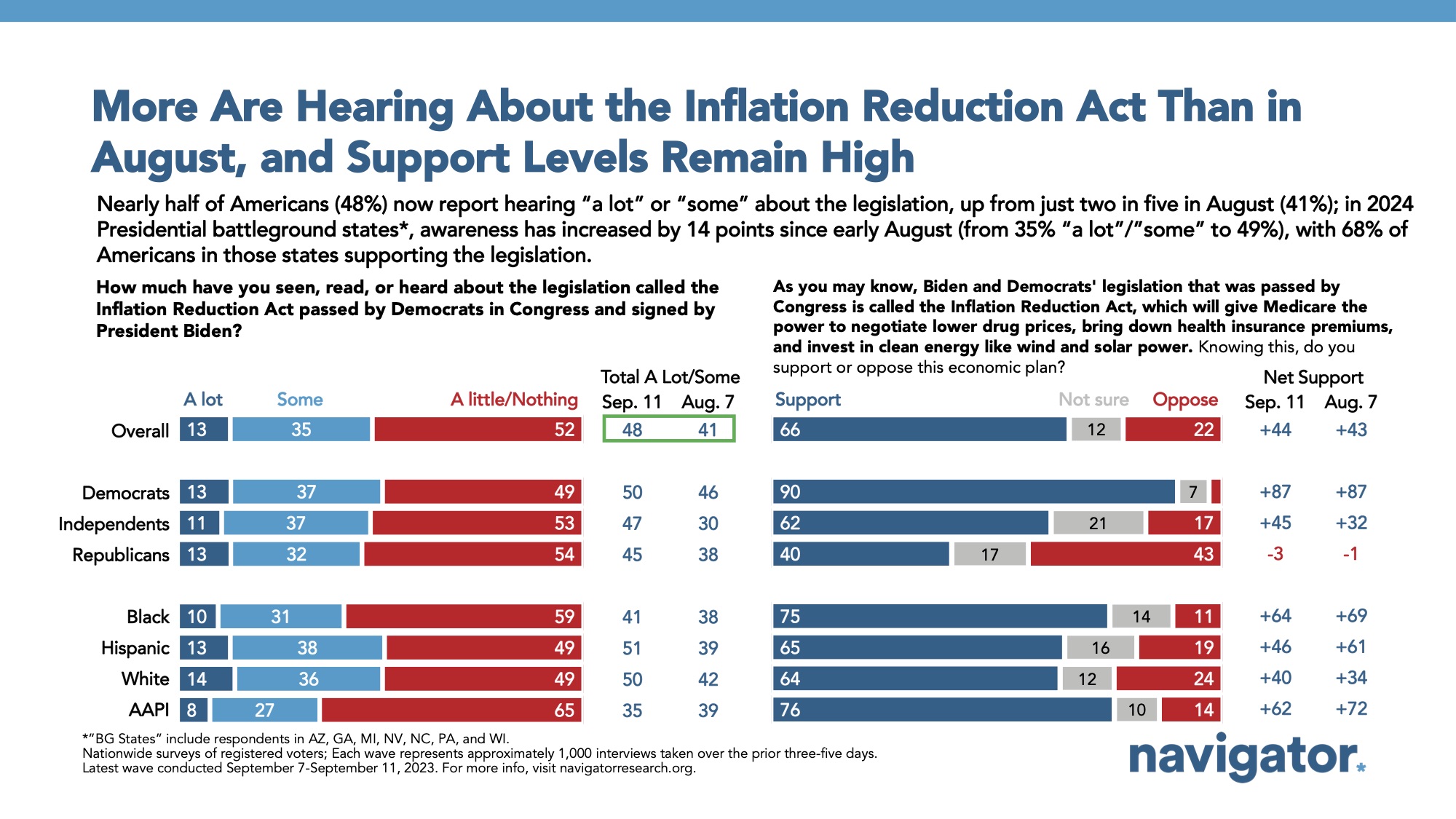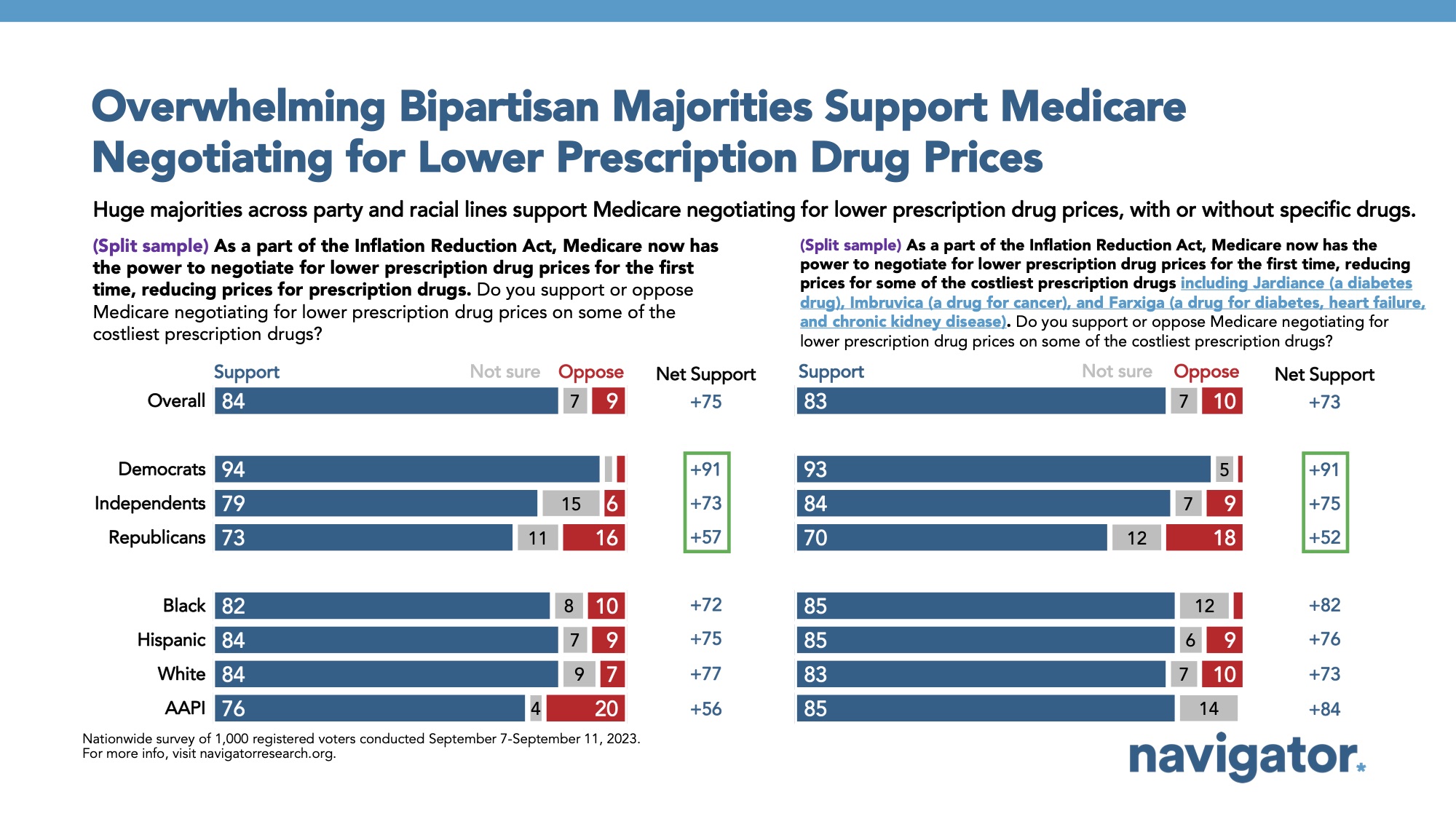POLL: Biden’s Alternative to Forgive Student Loan Debt
This Navigator Research report contains polling data on Americans’ latest attitudes toward President Biden’s latest actions on student loan debt and the most convincing reasons to support student loan debt forgiveness, tracking on support for the Inflation Reduction Act, and the latest perceptions of the state of the economy, including how much people feel they are paying for goods such as gas and groceries compared to a few weeks ago.
Most Americans believe Biden should find an alternative solution to forgive student loan debt following the Supreme Court blocking his original plan.
By a 16-point margin, most Americans believe Biden should find an alternative solution to forgive student loan debt (54 percent should find an alternative solution – 38 percent should not), including an overwhelming majority of Democrats (net +59; 76 percent should find an alternative solution – 17 percent should not), independents by a double-digit margin (net +14; 50 percent should find an alternative solution – 36 percent should not), and even three in ten Republicans saying the same (net -31; 31 percent should find an alternative solution – 62 percent should not). Americans who currently have student loan debt are most likely to believe Biden should find an alternative solution (net +60) compared to slim pluralities of those who have never had student loan debt (net +6), and those who previously had student loan debt and paid it off (net +1).
- President Biden’s latest efforts at student loan forgiveness is supported by three in five Americans when described as “creating a permanent solution that would include a more affordable repayment plan for borrowers and easing into repayment, so people who miss payments are not penalized” (net +34; 60 percent support – 26 percent oppose). Biden’s proposal has even higher levels of support among Democrats (84 percent support), Black Americans (80 percent), Hispanic Americans (67 percent), and Americans living in households earning less than $50,000 per year (61 percent). The latest plan is supported by a majority of Americans regardless of their personal experience with student loan debt, including those who currently have student loan debt (net +62; 75 percent support – 13 percent oppose), those who have previously had student loan debt but paid it off (net +35; 63 percent support – 28 percent oppose) and who have never had student loan debt.
- Americans are split on who to blame for why 43 million Americans who have been promised student loan debt relief will no longer be getting it between Congress (27 percent), the Supreme Court (23 percent), and President Biden (22 percent). Compared to early July, there has been a slight increase in the share who blame Congress (up 4 points) and a drastic decline in the share who blame the Supreme Court (down 13 points).
The most convincing reasons to support President Biden’s student loan debt repayment plan include that it will help our economy by increasing disposable income, making college degrees more attainable, and mitigating the increased expense of college. A majority of Americans find a range of messaging on student loans convincing, including:
- Making student loan debt repayment more affordable helps our economy. It frees up money people can use to buy goods and services to get our economy moving (net +40; 65 percent convincing – 25 percent not convincing);
- Making student loan debt repayment more affordable is crucial, as getting a college degree becomes more and more expensive in the United States and more jobs require a college education (net +38; 64 percent convincing – 26 percent not convincing);
- Making student loan debt repayment more affordable helps our economy. It frees up money people can use to buy goods and services and will help speed up the economic recovery from the coronavirus pandemic (net +30; 58 percent convincing – 28 percent not convincing); and,
- President Biden has already canceled more than $116 billion in student loan debt for millions of Americans; continuing to make student loan debt repayment more affordable is evidence he is keeping his promise to help deal with student loan debt (net +24; 55 percent convincing – 31 percent not convincing).
Economic sentiment remains negative: three in five Americans feel uneasy in regards to their personal finances.
74 percent of Americans rate the current state of the economy as either “not so good” (39 percent) or “poor” (34 percent), with only one in four who rate the economy as “excellent” or “good” (25 percent). Most Americans also believe the economy is getting worse (56 percent), compared to just 17 percent who believe the economy is getting better. More than three in five Americans feel uneasy about their personal finances over the next few months (63 percent), with greater concern concentrated among those who work in the service industry (72 percent uneasy) and Americans living in households earning less than $50,000 per year (70 percent uneasy), compared to those living in households earning more than $100,000 per year (50 percent uneasy).
- 87 percent of Americans feel they are paying more for groceries in their communities compared to a few weeks ago – among whom 36 percent feel they are paying “a lot more.” Americans are feeling the greatest impacts of inflation from groceries (86 percent), gas (74 percent), utilities (58 percent), and housing (44 percent). Reminder: Inflation is the top priority Americans want Congress to focus on (48 percent).
Four in five Americans are feeling the weight of inflation when it comes to paying more for gas in their communities as compared to a few weeks ago.
78 percent of Americans feel they are paying more for gas in the last few weeks, with 32 percent who feel they are paying “a lot more” compared to weeks prior. Among the top three most to blame, Americans predominately hold oil and gas companies responsible for gas prices increasing (64 percent blame), followed by foreign conflicts (53 percent blame), global supply chain issues (52 percent blame), and President Biden and Democrats (44 percent blame). Blame on Biden is primarily driven by Republicans (81 percent blame), as only one three independents say the same (33 percent).
- The public is less likely to blame increased gas prices on high seasonal energy demand (30 percent), policies to combat climate change (25 percent), or increased summer travel (17 percent).
Support for the Inflation Reduction Act remains strong, with overwhelming bipartisan majorities supportive of Medicare negotiating drug prices.
Two in three Americans support the Inflation Reduction Act when framed as legislation “which will give Medicare the power to negotiate lower drug prices, bring down health premiums, and invest in clean energy like wind and solar power” (net +44; 66 percent support – 22 percent oppose), including support from nine in ten Democrats (90 percent), two in three independents (65 percent), and two in five Republicans (40 percent). Despite overwhelming levels of support, less than half of Americans report having seen, read, or heard something about the legislation (48 percent), with only 13 percent of Americans who report heading “a lot” about it. A split-sample message test highlighting the outcomes of the Inflation Reduction Act each earned outstanding levels of support, regardless of whether drug names were used in the descriptor:
- As a part of the Inflation Reduction Act, Medicare now has the power to negotiate for lower prescription drug prices for the first time, reducing prices for prescription drugs. (net +75; 84 percent support – 9 percent oppose, including support from 79 percent of independents); and,
- As a part of the Inflation Reduction Act, Medicare now has the power to negotiate for lower prescription drug prices for the first time, reducing prices for some of the costliest prescription drugs including Jardiance (a diabetes drug), Imbruvica (a drug for cancer), and Farxiga (a drug for diabetes, heart failure, and chronic kidney disease) (net +73; 83 percent support – 10 percent oppose, including support from 84 percent of independents).

